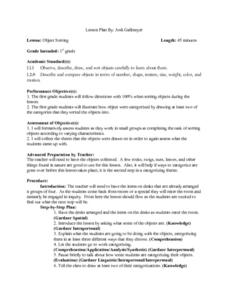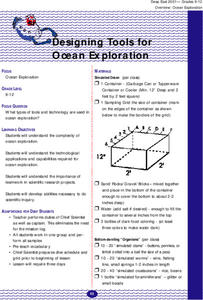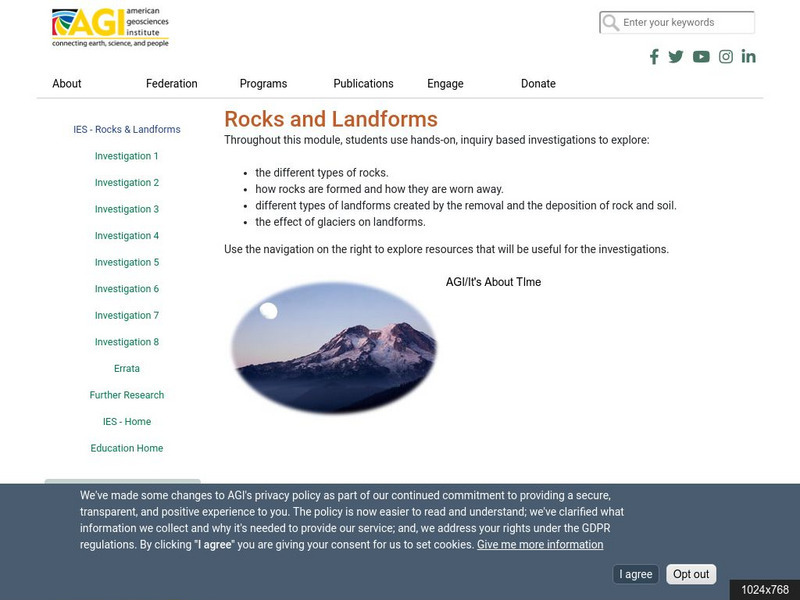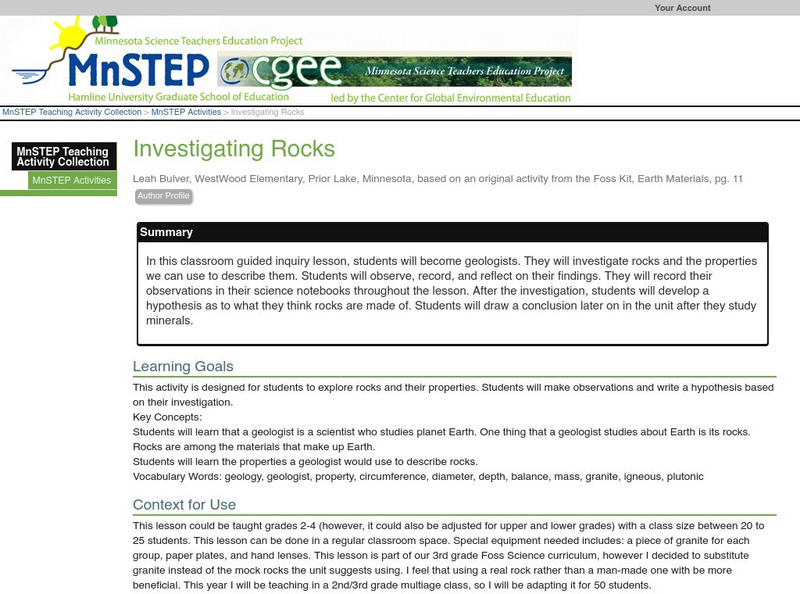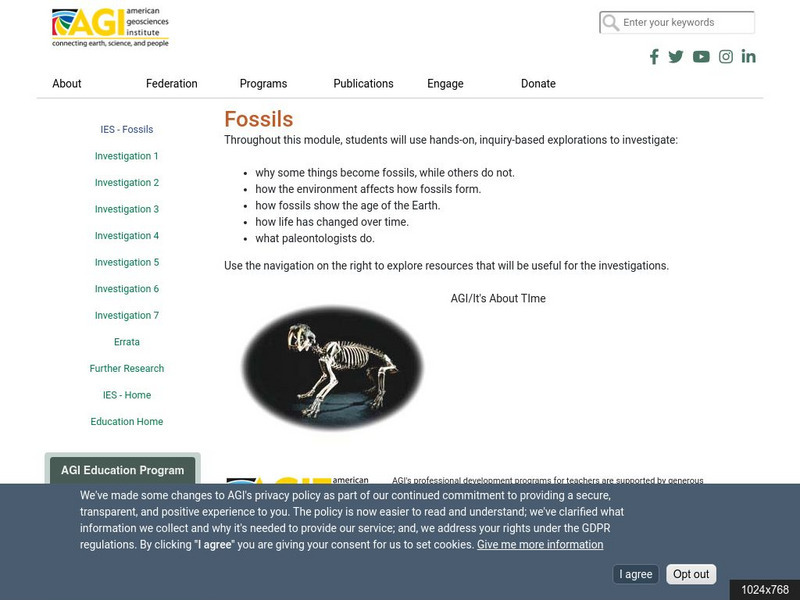Curated OER
Bermuda: Search for Deep Water Caves 2009: Out of Darkness
Students analyze the three models on the origin of troglobitic fauna. In this life science lesson, students also consider how the Zonation model explains the fauna's origin. They also use the Internet to research solutional and volcanic...
Curated OER
Changes Inside Planets
Pupils investigate the concept of planetary differentiation. They complete an experiment to simulate it using gelatin and food. The lesson includes vocabulary to increase reading comprehension skills as part of the inquiry. The lesson...
Curated OER
Contextual Clues
Learners observe and interpret images of artifacts in different contexts in order to recognize importance of leaving artifacts in original context to correctly understand their meaning, and observe what is surrounding object to interpret...
Curated OER
How Old Is Mike?
Students examine the absolute dating of fossils, they use a list of names and ages to determine the difference between relative age and absolute age. They explore the relative age and absolute age of people and of fossils.
Science 4 Inquiry
States and Phases of Matter
Plasma is the most common phase of matter in our universe. Scholars explore the change of energy as molecules change phases of matter. They rotate through stations, graphing the changes in energy level.
Science 4 Inquiry
Let's Get Moving
Rivers top the list of causes of erosion over time. Scholars experiment with wind, water, and ice reshaping sand. They connect the simulations facts about erosion and deposition to understand unique landforms such as the Grand Canyon and...
Curated OER
Geologic Time: Relative and Absolute Dating
High schoolers investigate relative and absolute dating; determine the difference between the two dating systems; and apply this knowledge by creating a geologic timetable of their own.
Curated OER
Will It Sink Or Float?
Have your class predict whether objects will sink or float in water. Learners consider a data table of mass, volume and whether the object sank or floated. They develop an evidence-based explanation for the results.
Curated OER
Object Sorting
First graders follow directions when sorting objects. They illustrate how objects are categorized by drawing at least two of the categories that they sorted the objects into. Students work in small groups at completing the task of...
Curated OER
Science: Floating and Sinking Objects
Second graders discuss why some objects float while others sink. They examine various objects and predict whether or not they will sink or float. Students discover the properties needed for objects to float.
Curated OER
Designing Tools for Ocean Exploration
High schoolers explore the complexity of ocean exploration and the technological applications and capabilities required for ocean exploration. They consider the importance of teamwork in scientific research projects.
Curated OER
Units and Measurement
Students discuss the word weight, how much they weigh and the conccept of heavy and light. They hear the story of measurement and the metric system. They work in groups and measure and record items found in the classroom and use a...
Curated OER
Where Have All the Glaciers Gone?
Fourth graders discover that scientists examine evidence from around the world in order to explain global climate change. They see that records of climate change exist, and describe photographs interpreting changes in glaciers over time.
Curated OER
Making Cultural Connections
Students explore cultures through storytelling. They read African folktales. Students discuss characteristics of folktales. They research and write a folktale that includes an animal. Additional cross curriculum activities are included.
Curated OER
Will it SINK or Float?
Students predict whether objects will sink or float in water. They classify objects as sinking or floating in water. Students identify and explain similarities between objects that sink and float.
Curated OER
Cleansing, Sparkling Koos
Students explore the importance of water conservation and investigate how plants clean water.
Curated OER
Designing Tools for Ocean Exploration
Students research the methods and tools used in ocean exploration. They, in groups, simulate an ocean exploration and consider what tools facilitate the exploration's objectives.
Curated OER
Life in a Cup
Third graders make and maintain a mini terrarium. They keep a daily journal of what happens in their terrarium and record daily observations and measurements.
American Geosciences Institute
American Geosciences Institute: Rocks and Landforms
Eight hands-on lessons module where students learn about rocks and landforms. These inquiry-based investigations explore the different types of rocks, how they are formed, the different types of landforms, and the effects of glaciers on...
Science Education Resource Center at Carleton College
Serc: Investigating Rocks
In this classroom guided inquiry lesson, students will become geologists. They will investigate rocks and the properties we can use to describe them. Students will observe, record, and reflect on their findings. They will record their...
Other
Digital Library for Earth System Education: Teaching Box: Mountain Building
A suite of lessons focusing on all aspects of how mountains are formed. Inquiry-based exploration of mountain building includes the rock cycle, mountain formation, plate tectonics, earthquakes, volcanoes, erosion, rocks, minerals, and...
American Geosciences Institute
American Geosciences Institute: Fossils
Seven hands-on lessons module where students learn about fossils. These inquiry-based investigations explore how fossils form, properties of fossils, comparing fossils, how they show the age of the Earth, and what paleontologists do.
American Geosciences Institute
American Geosciences Institute: Materials and Minerals
Seven hands-on lessons module that allows students to learn about materials and minerals. These inquiry-based explorations investigate properties of materials, where mineral deposits can be found, how deposits are formed, how minerals...










